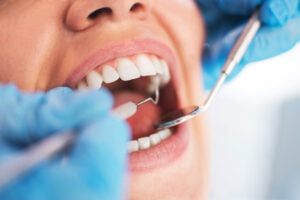Oral Surgery
Home » Treatments » Oral Surgery
Dentistry dedicated to surgical procedures
Oral surgery involves a range of intricate interventions, from tooth extractions, wisdom tooth removal, and dental implants to addressing jaw-related issues and more complex surgical treatments.

Experts in oral surgery
Our dentists have extensive training and skill in handling diverse oral and maxillofacial conditions. Oral surgery aims to alleviate discomfort, correct dental irregularities, and restore oral health. We employ advanced techniques and technology to ensure optimal results while prioritising our patients’ comfort and wellbeing.
Expert wisdom tooth removal services
Are you experiencing discomfort due to your wisdom teeth? Look no further. Our dedicated team of dental professionals specialises in efficient and effective wisdom tooth removal. At Clarendon Dental, we understand the urgency and potential discomfort that can accompany problematic wisdom teeth. We offer immediate appointments and ensure a seamless experience.

Expert oral surgeons for complex extractions
Our practice is proud to offer the expertise of a specialised oral surgeon, ensuring that even the most complex wisdom tooth extractions are handled with precision and care. With our team’s advanced skills and state-of-the-art facilities, you can trust that your oral health is in excellent hands.
No waiting, immediate assistance
Why endure the discomfort while waiting for your wisdom teeth to be removed? We prioritise your comfort and offer appointments without unnecessary delays. Are you tired of being on a waiting list for your wisdom tooth removal? Contact us today, and we’ll ensure you receive the attention and care you need promptly.
Accepting referrals from other dentists
We welcome referrals from other dental practitioners. If you are a dentist who wishes to refer to us, please use the dentist referral form link below. If you’ve been referred to us by your dentist for wisdom tooth removal, rest assured that you’ll receive specialised care, ensuring a smooth process from referral to post-extraction care.
Don’t let any oral discomfort persist. Our team is here to alleviate your wisdom tooth pain. Take the first step towards a healthier, pain-free smile.
Contact us today to schedule your appointment and take the first step toward a more comfortable, healthier smile.
 Simple or surgical extractions
Simple or surgical extractions
If you need to have a tooth extraction, you can rest assured that you are in safe hands. We take an x-ray and assess your teeth to ascertain the best method of removal, which will either be a simple extraction or a surgical extraction.
A simple extraction is performed on a tooth that is visible in the mouth. It involves loosening the tooth and removing it with dental forceps under local anaesthetic. A surgical extraction involves making a small incision in the gum to remove a tooth that may have broken off or is concealed under the gum.
Meet our specialist oral surgeons.
Chiara and Abdul have a wealth of experience in oral surgery, providing expert care and treatment to patients for many years. Their primary focus is ensuring patient comfort, satisfaction, and optimal oral health. When you choose to undergo oral surgery with them, you can expect personalised attention and a commitment to excellence.
Tooth extraction
Oral surgery involves diagnosing and treating oral conditions that require surgical intervention. These may include:
- Extensive decay
- A baby tooth that has failed to fall out
- An impacted wisdom tooth
- A broken tooth
- Making more space for orthodontic treatment
 Dental implants
Dental implants
Dental implants involve placing implants in the jawbone to which replacement teeth are later fitted. Dental implants are a long-lasting solution to missing teeth and can also provide increased stability to a new or existing denture.
FAQs
What is involved in a tooth extraction?
Tooth extraction is a routine oral surgical procedure in which a dentist or oral surgeon carefully removes a tooth from its socket in the jawbone. It's typically performed under local anaesthesia to ensure the area is numb and to minimise discomfort. The dentist or oral surgeon will gently loosen the tooth and then extract it using specialised instruments, followed by appropriate aftercare instructions for proper healing.
How important is it to remove impacted wisdom teeth?
Impacted wisdom teeth, commonly known as third molars, can cause various oral health issues if not removed. They may grow at an angle or remain trapped within the jaw, leading to pain, infections, crowding, and even damage to surrounding teeth. Surgical removal of impacted wisdom teeth is often recommended to prevent potential complications and maintain overall oral health.
Are dental implants considered oral surgery?
Yes, dental implants involve a form of oral surgery. They consist of surgically inserting artificial tooth roots into the jawbone to support prosthetic teeth or dental bridges. This procedure is performed by an oral surgeon or a specially trained dentist, and it is a highly effective long-term solution for replacing missing teeth.
What is the typical recovery period after oral surgery?
The recovery period following oral surgery can vary based on the specific procedure and individual healing. Generally, patients may experience some swelling, discomfort, and minor bleeding immediately after surgery. Full recovery can take several days to a few weeks, during which proper post-operative care, including rest, prescribed medications, and following the dentist's advice, is crucial for optimal healing.
Are there any risks or complications associated with oral surgery?
While oral surgery is generally safe, like any surgical procedure, there are potential risks and complications. These can include infection, excessive bleeding, nerve damage, and in rare cases, issues related to anaesthesia. It's essential to discuss these risks with your oral surgeon and follow their pre and post-operative instructions to minimise the likelihood of complications.
Can I eat or drink before oral surgery?
It's typically advised to avoid eating or drinking for a specific period before oral surgery, especially if anaesthesia is involved. Your oral surgeon will provide clear pre-operative instructions, which may include fasting for a set number of hours to reduce the risk of complications during the procedure. Always follow the guidelines provided by your surgeon to ensure a safe and successful surgery.




 Simple or surgical extractions
Simple or surgical extractions Dental implants
Dental implants
